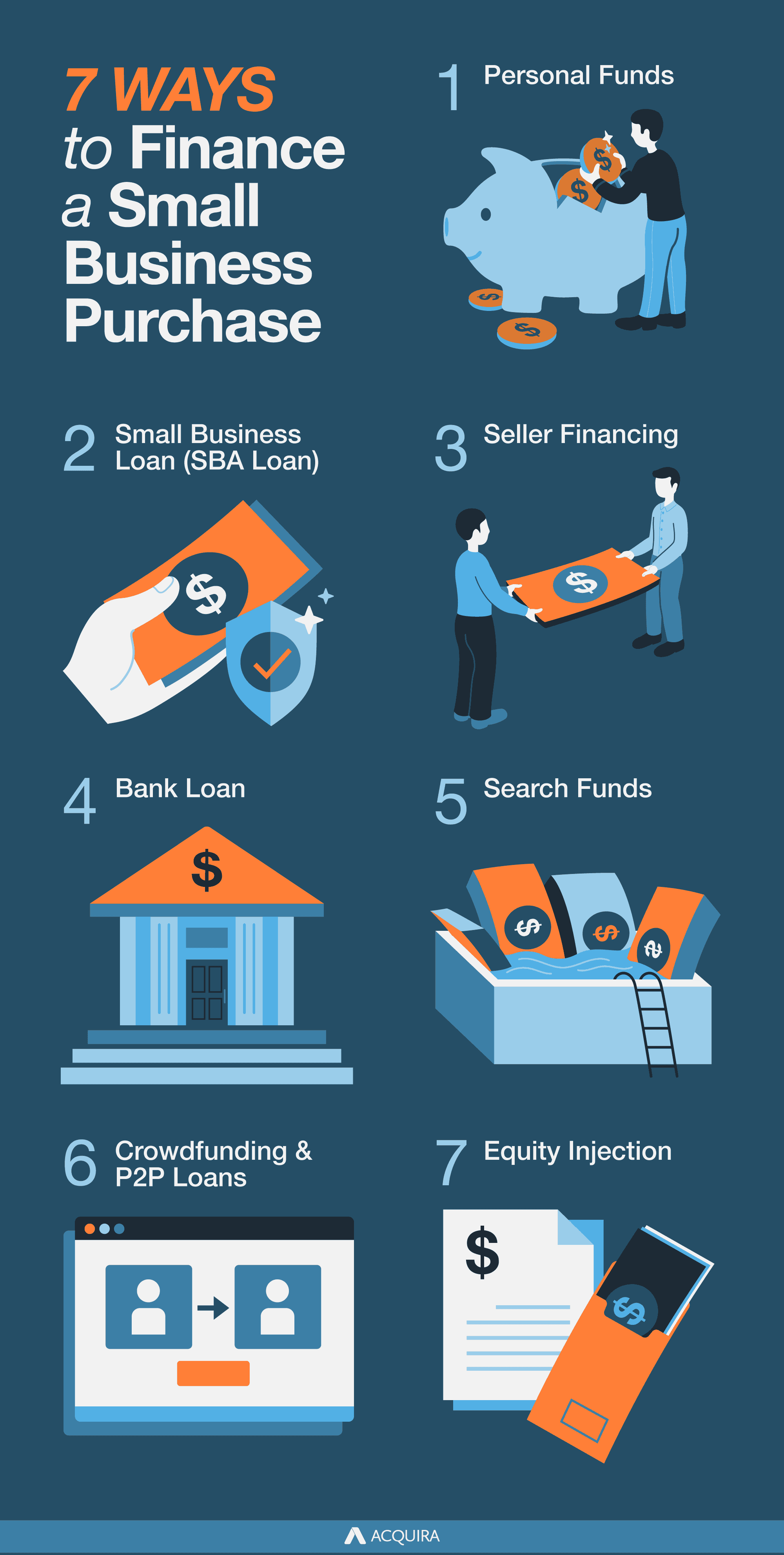- How to finance the purchase of an existing business with an SBA loan
- How to combine your personal funds with other financing options
- How to take advantage of seller financing to help fund a business purchase
- How equity investments can help you cover your down payment
The problem isn’t new: approximately 10,000 baby boomers are retiring every day and nearly 16 million business owners will be at or above retirement age in the next ten years. That represents trillions of dollars worth of business assets that need to switch hands because otherwise, millions of jobs would be at risk.
This situation has birthed the Acquisition Through Entrepreneurship movement.
Because of this massive flood of businesses and the potential employment problem it could create, the Federal government has stimulated Main St. with funding through the SBA to encourage more transactions.
This low cost of capital has made the concept of buying a business make much more financial sense than starting one yourself or becoming a franchisee. These people are known as Acquisition Entrepreneurs.
However, an SBA loan isn’t the only way to purchase a business. In this article, we’ll dive into eight different ways you can get the money to buy a small business.
We also provide a free tool to help you calculate different possible loan terms and see what you stand to make after exiting the business.
So, intrepid business buyers, let’s dive in!
7 Ways to Finance a Small Business Purchase

Whether you are a novice entrepreneur trying to finance your first purchase of a small business or an established entrepreneur looking for a small business acquisition to expand your portfolio, you need money.
What options are available to obtain financing to fund this? A bank loan or your own savings? Asking a friend or applying for a line of credit? There are no rights and wrongs when it comes to getting the money to buy a small business.
Your choice will depend on your unique situation — the nature of the business, the size of the business, the various legal and regulator requirements, etc. It’s important to note that it is often possible to combine funding sources in order to acquire a business. For example, an SBA loan is often combined with seller financing to cover the loan, while a certain amount of equity could be given up in order to cover the down payment. There are many combinations you can work with.
1. Personal Funds
The first and easiest source of financing for your next business acquisition is using your own money. You might have enough funds in your bank to buy the business. Having stock investments can also be a potential source of funding.
Many people think of mortgaging their homes, but this is not recommended. Remember, only invest the money that you can afford to lose.
Financing a business purchase with cash is a rare practice and if you do this you will forgo the opportunity to further grow your investment through leveraging it. There is almost always a combination of equity financing and debt financing. You can fund the down payment from your personal funds and choose other ways to finance the remainder.
2. Small Business Loan (SBA Loan)
The Small Business Administration connects entrepreneurs with lenders and provides guarantees to the lenders instead of issuing the loan amount itself. This is without a doubt the most popular method of funding a small business acquisition and requires any Acquisition Entrepreneur to file an application for an SBA loan.
SBA loans are considered less risky loans for the banks; therefore, they offer lower rates to the applicants.
You can apply for SBA loans to fund your purchase, working capital requirement, or inventory purchases of the newly acquired business. To qualify for an SBA loan you must be acquiring a healthy, for-profit business and be putting in substantial owner equity, although there are a number of other requirements.
Ideally, you can combine your personal funds with SBA loans to put together the total amount required to buy the business. If you have a good credit score and at least two years in business, SBA loans are probably the best option for you.
3. Seller Financing
Seller financing is a term that originally came from the real estate industry where the seller handles the mortgage instead of a financial institution. The idea has been replicated in the M&A industry. The buyer of the business gets funding from the seller instead of applying for a loan.
If you want to go for seller financing, be aware that such loans are issued at competitive interest rates. The advantages of seller financing include quick purchase and the option of tying the payment of the loan with business performance. If you're also going for an SBA loan, however, be aware that the SBA puts limits on the type of seller financing and how long the seller can give advice to a new owner post-sale. Adding the option encourages the seller to disclose all the facts about the business.
Check Out Acquira’s Free SBA Model Calculator
Now seems like a good time to take a moment to mention our Free SBA Model Calculator. The calculator will help you lay out different financing options for a business acquisition, with special consideration paid to SBA loans, seller financing, and equity injections (more on that later).
We’re providing the tool through Google Sheets to make it as accessible as possible. Please remember to make your own copy of the document and watch this quick video tutorial to learn how to use it.
Free Tool: Acquira’s SBA Model Calculator
This calculator is just one example of the training Acquira offers to Acquisition Entrepreneurs through our Accelerator Program.
The Accelerator Program is the fastest way to learn the intricacies around acquiring a business. From sourcing, vetting, and closing on the deal, the program will walk you through everything you need to know in order to acquire a 7-figure business within seven months.
Through the Accelerator, you gain access to:
- Acquira’s MBA-level M&A training and systems
- Our Investment Committee, which allows you test your investment thesis and business instincts
- Access to our vendors at preferred rates
- Access to Acquira as a potential equity investor
If you’d like to learn more about how we can help with your acquisition journey, fill out the form below:
4. Bank Loan
Conventional bank loans will always be an option to consider. But they might not be feasible for most people. That’s because banks usually require substantial physical assets belonging to the company as collateral for the loan.
If you have some assets with the bank, they could give you a loan to fund your purchase. They'll generally want a down payment of at least 30%. But there are additional requirements that might make this more difficult to obtain. For example, you need a great credit score and an SBA-backed guarantee.
5. Search Funds

This is an investment vehicle that is put together by business searchers who chose to use privately raised capital to search for, acquire, and grow privately held companies.
The leadership of a search fund – known as the search fund partners – will use the fund to pool private investors’ capital in order to fund the search and acquisition process. These often target smaller and midsized companies.
The process of setting up a search fund is relatively straightforward:
- Raise initial capital;
- Search for acquisition targets;
- Acquire a company;
- Grow the business;
- Exit for profit.
To launch a search fund, partners first need to raise enough capital to cover the overhead costs. They then conduct outreach to identify potential acquisition targets. Once they find a potential target they conduct their due diligence and, if they think it will make a good deal, enter into negotiations to acquire the business.
The ultimate goal of these funds is to increase the business value and eventually exit at a profit.
6. Crowdfunding & P2P Loans
Crowdfunding and P2P lending is yet another financing method to fund your small business acquisition. Through crowdfunding and P2P lending, different third-party online intermediaries connect the lenders/investors with the business buyers. You can get equity-based crowdfunding or reward-based crowdfunding.
The intermediaries charge you a service fee for funding. P2P lending doesn’t necessarily have to be done through third parties. Instead, you can leverage your own network of interested investors to fund the purchase.
7. Equity Injection
Some Acquisition Entrepreneurs are able to access equity funds, which can help fund their business acquisition by providing a cash injection toward the down payment. Usually for as little as 20% of the down payment all the way to 80%.
So, if the down payment is 10% of the transaction and the other 90% comes from debt like an SBA loan, then the cash injection would be 2% to 8% of the total purchase price.
In return, the fund could receive 2.5 times that amount in equity or 5% to 20%. In these cases, there would be a shareholders agreement to protect the rights of the minority shareholders and possibly some preferred dividends.
Of course, the exact terms of an equity injection can change greatly depending on the lender.
Conclusion
There are numerous ways to leverage different financing options to make a business purchase happen.
You should analyze which option of funding works best for you before you decide how to finance a business acquisition. In many cases, you can combine financing sources in order to raise the total amount required. Tools like Acquira’s Free SBA Model Calculator can help in this process.
The calculator is just one example of the training we provide through our Accelerator+ Program. If you’d like to learn more about the program and how Acquira can help with your business buying journey, schedule a call with an Acquira Representative right now through the form below.
Key Takeaways
- Different financing sources can be combined to help you acquire a business.
- The most popular source of funding is an SBA loan.
- An equity injection can be a great way to cover the down payment in exchange for a percentage of ownership in the company.
Acquira specializes in seamless business succession and acquisition. We guide entrepreneurs in acquiring businesses and investing in their growth and success. Our focus is on creating a lasting, positive impact for owners, employees, and the community through each transition.



